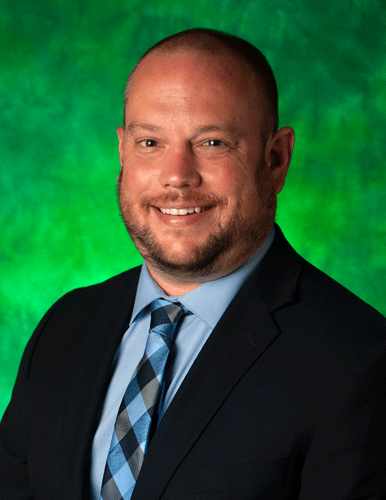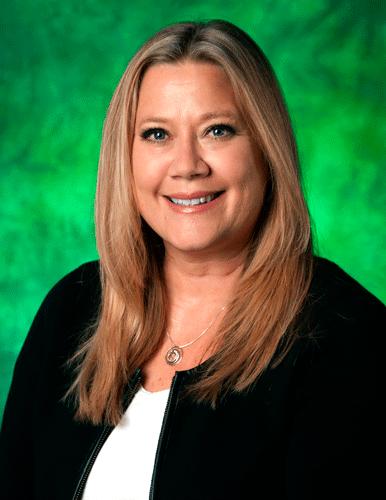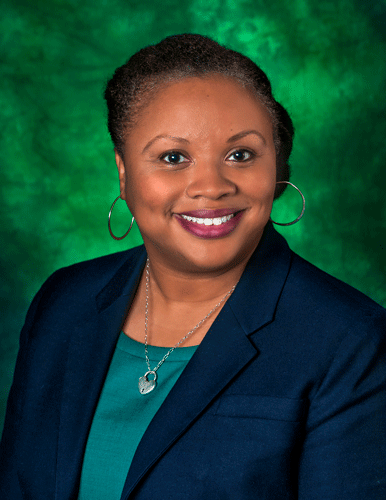UNT announced today three major leadership moves in the Division of Research and Innovation that will expand research leadership opportunities for faculty members while propelling UNT’s enterprise as a Tier One research university forward, says Mark McLellan, the university’s vice president for research and innovation.
Aaron Roberts, professor of environmental toxicology in the College of Science and director of UNT’s Advanced Environmental Research Institute (AERI), has been appointed to serve as associate vice president of research. He replaces Pamela Padilla, professor of biological sciences, who was recently appointed dean of College of Science. In addition, Amie Lund, associate professor of environmental toxicology, will now lead AERI. Chandra Donnell Carey, associate professor of rehabilitation and health services in the College of Health and Public Service will serve in a newly created, yearlong appointment as a faculty fellow.
“I am delighted to welcome these three faculty members to our leadership team,” says McLellan, who joined UNT two years ago and has been working toward growing the university’s research portfolio and providing better research experiences for all UNT faculty and staff. “Their combined breadth of knowledge about all things UNT will be invaluable to me as we continue to expand and strengthen our vibrant research enterprise. Their strong collaborative abilities and commitment to advancing the university’s research mission will help to ensure that service to faculty remains foremost in our minds.”
ABOUT THE APPOINTEES

Prior to his appointment as associate vice president for research Aaron Roberts, professor of environmental toxicology in the College of Science, spent the last two years as the director of the Advanced Environmental Research Institute. He is considered an expert on the fate and effects of chemical contaminants in freshwater and marine ecosystems. His research group has been funded by federal and state agencies as well as the private sector. Most recently, he secured a $300,000 award from Texas General Land Office (GLO) for toxicological studies that will inform oil spill response in the state.
Roberts earned his bachelor’s degree in biology from the University of Missouri and his master’s and doctoral degrees in zoology from Miami-Ohio University. He completed his postdoctoral training in environmental toxicology at Clemson University.
“Aaron is an accomplished researcher, teacher and leader, and I am confident he will continue to build on the significant contributions made by Pam,” McLellan says. “His deep scientific knowledge will serve us as well, as he steps in to manage a series of science core facilities, compliance issues and sponsored research development.”
As associate vice president, his portfolio will include overseeing the management of UNT’s shared instrumentation facilities across campus, working with advisory groups and directors of each facility, and assisting with the development, approval and implementation of partnership agreements with other universities, national labs and industry. Additionally, Roberts will be heavily involved in research development training and limited submissions, among other duties.
“To get this kind of opportunity at a Tier-One university doesn’t happen every day, so I am very excited and honored. It’s been fantastic working with Mark and the other institute directors over the last two years, as well as the faculty we collaborate with,” Roberts says. “I hope to bring some lessons learned to my role as an administrator. I was very fortunate to work closely with Pam on a number of projects while I was the director of AERI, and I hope that I can build on the things she has set in motion.”

With the appointment of Roberts as associate vice president, Amie Lund, associate professor of environmental toxicology in the College of Science, will assume the role of director of AERI. She worked closely alongside Roberts as the associate director of AERI and becomes the first woman to lead one of UNT’s four Institutes of Research Excellence.
Her research discoveries in investigating air pollution and obesity have been recognized nationally, and she was recently funded through a three-year grant from the National Institutes of Health. Lund earned a bachelor’s degree in biology from Kansas State University and a doctoral degree in philosophy and biomedical sciences with an emphasis in toxicology from the University of New Mexico.
“I am honored and excited to have the opportunity to serve as the director of AERI. Our institute includes a diverse and innovative group of scientists leading the way in collaborative environmental research and a fantastic staff whose support helps us succeed,” Lund says. “I have worked with Aaron on many research projects and graduate student committees. As the associate director of AERI, we worked together leading the efforts of AERI. So, this feels like a very natural transition for me to continue to build on his many accomplishments.”
Lund said her goal as director of AERI is to provide resources and support to help grow its membership and offer increased opportunities for interdisciplinary research and scientific discovery related to pressing environmental issues. She also plans to promote increased opportunities for student research.
“One of my main goals will be to focus on integrating research and education by providing more mentored-research opportunities for our students to be actively involved in all aspects of environmental research,” Lund says. “It’s important to provide translational training opportunities that prepare our future scientists, workforce and policymakers to address challenging environmental, sustainability and injustice issues in novel ways.”

Chandra Donnell Carey, an associate professor of rehabilitation and health services in the College of Health and Public Service has been tapped to serve as the inaugural Vice President for Research Faculty Fellow. She holds a bachelor’s degree in psychology from Wittenberg University, a master’s degree in rehabilitation counseling from the University of Illinois at Urbana-Champaign and a doctoral degree in rehabilitation counselor education from Michigan State University. She has been at UNT since 2009 and currently serves as academic associate dean for the College of Health and Public Service.
The fellowship was created to provide an opportunity for faculty members to broaden their training and experience in research administration. Carey’s experience is rich in collaborating with researchers across disciplines on critical research associated with societal equity issues.
“It’s such an honor to be named as the inaugural faculty fellow. To be a social scientist and to be included is quite the honor and really aligns with the interdisciplinary landscape of high impact research today,” Carey says. “Having the voice of a social scientist will hopefully broaden that lens at UNT, and I'm thrilled to have the opportunity to bring that perspective and further embed that collaborative spirit into the university’s research agenda.”
Carey’s research focuses on access and utilization of mental health services for underserved populations and led to her initiating UNT’s Center for Racial and Ethnic Equity in Health and Society. CREEHS seeks to increase the quality of life for all Texans and to foster an environment for economic growth and innovation by narrowing longstanding racial and ethnic gaps in health care.
Carey is one of four co-PIs from UNT who were recently awarded a $1.5M grant from the Health Resources and Service Administration to investigate how to expand a bilingual trauma-based behavioral health workforce in integrated health settings.
“Having the exposure to the different areas that encompass research administration will increase the research literacy of our faculty and really help so many with that process,” Carey says. “I really hope to glean and soak up as much as I can from the experts in the office during this experience over this next year and take it back to the faculty I work with.”
